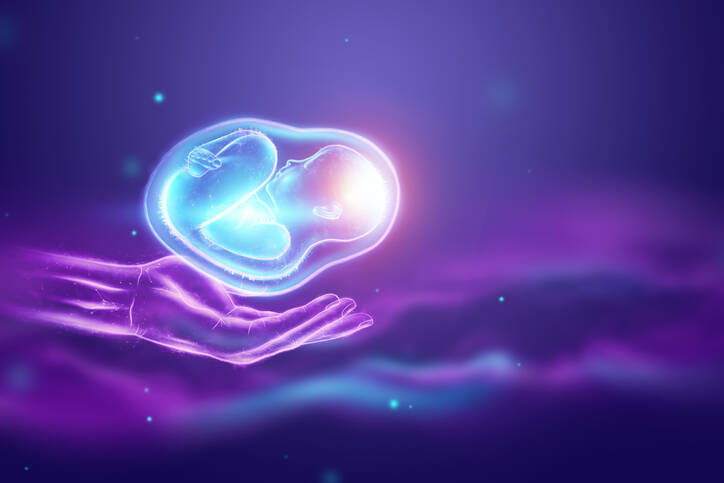- lf.upjs.sk - Physiological changes in pregnant women
- wikiskripta.eu - Pregnancy
- whatttoexpect.com
14th week of pregnancy. How does the second trimester begin?

This period of pregnancy is considered by most expectant mothers to be the most pleasant. Gradually, nausea subsides, energy returns and the tummy takes on the right pregnancy curves.
Article content
This and other interesting facts can be found further in our article.
How is the baby doing?
Most of the internal organs are already developed. Therefore, the risk of damage to the fetus by drugs or infections is much lower.
At 14 weeks of pregnancy, the baby begins to use facial muscles. The first grimaces, lip smacking and attempts to smile appear.
The baby can even suck its thumb, which is important. It trains the sucking and swallowing reflex.
The genitals are fully developed. But it can still be challenging to determine the baby's sex with certainty on ultrasound.
Although you are already in the 4th month, you still have to wait to feel the first movements.
The weight of the baby should be around 30-40 g and the length 8-12 cm. Even though it is growing steadily, there is still plenty of room to move in the tummy.
Although you can't feel it, your baby can stretch, kick and turn around happily. His movements are much smoother now, though.
The table shows the approximate measurements of the fetus at 14 weeks, as measured by the sonographer
| Total length | CRL Distance from vertex to coccyx | Weight | HC Head circumference | BPD Transverse head diameter | AC Abdominal circumference | FL Femur length |
| 12 cm | 82-95 mm | 43 g | 97.9 mm | 29.6 mm | 80.6 mm | 13.1 mm |
You can read more about fetal measurements in the article:
Ultrasound in pregnancy: fetal size, what is fetal biometry?
The baby's skin is covered by the first hairs and a fine coating called lanugo. These fine hairs cover the fetus during the 4th to 8th month. Its function is to keep warm until the baby's subcutaneous fat accumulates and takes over this function.
After birth, some babies still have remnants of the lanugo or fine hairs even on the face. However, these disappear over time.
The baby's lungs are full of amniotic fluid. It receives the necessary oxygen and nutrients through the placenta. But even so, the baby gradually begins to practice breathing movements.
The digestive system is also being prepared. While in the tummy, the baby swallows the amniotic fluid and the remains of detached tissue and cells. The baby's intestines begin to produce meconium, which will form its first stool after birth. It's also called smolka.
The contents of the intestine, however, are mostly amniotic fluid. It is absorbed into the baby's blood and excreted through the urinary system. In other words, the baby pees even in the mother's belly. But the amniotic fluid remains pure. The actual excretion is through the placenta.
In some cases, however, it can be released prematurely. In that case, there is a risk of inhaling the pitch during labour, which is called meconium aspiration syndrome.
The fetus has already developed a sense of touch and, according to some research, is beginning to hear. You can talk and sing to it.
How does mommy feel at 14 weeks of pregnancy?
You have just entered the second trimester of pregnancy. Your tummy is starting to have the right pregnancy curves. Now is the time to look around for comfortable maternity pieces for your wardrobe.
During this period, your belly grows quite considerably. The baby starts to grow at a really fast pace. This will of course be reflected in your weight.
Don't let this scare you off and forget about dieting. If in doubt, consult your gynaecologist. However, think especially about the health and well-being of your baby. After the birth, your figure will return in time.
During pregnancy, body weight increases by an average of 9-15 kg. This is the result of the enlargement of the fetus and uterus, but also of the placenta, amniotic fluid, increased blood volume and interstitial fluid.
Read more in the article.
Don't worry that your pregnancy tummy is too small or too big. Every woman has a different height and body shape. The size of the tummy also affects whether it is a first or repeat pregnancy.
Read also the article.
In most cases, the nausea has subsided as well. However, still be sure to have a regular intake and a balanced diet. Rather, choose foods that will keep your blood sugar and energy levels stable.
Keep a small snack with you at all times, as an empty stomach often leads to nausea more quickly than hunger.
With the start of the second trimester, symptoms of tiredness and fatigue also ease. The body has almost finished forming the placenta and the baby's organs and energy can be focused elsewhere. Frequent urination has also eased.
Although the breasts are still growing, they are not as sensitive and sore. You may notice that the areolae are becoming darker and the nipples larger. They are shaping up and preparing for breastfeeding.
Colostrum, which is the first milk, has begun to form. It's full of strengthening and healing substances and has a significant effect on your baby's immunity. So don't try to squeeze it out. It's the ideal start in life for your baby.
You may need more than one bra, because breast size and shape change constantly, both during pregnancy and after birth. It is important that you feel comfortable in each one.
After giving birth, you will use a nursing bra that can be conveniently and comfortably unclasped and fastened while breastfeeding. However, you should get one size larger than you normally wear.
Possible problems not only during the 14th week of pregnancy
The second trimester of pregnancy is considered to be the calmer or more pleasant period. Nevertheless, certain problems and inconveniences often occur. Many of them are harmless, but they can properly trouble the mother-to-be.
Abdominal pain
There are also certain pains associated with the growth of the uterus. They appear most often around the 14th week. However, you can also feel them at any time during pregnancy.
They are caused by stretching of the ligaments that support the uterus. This can cause sharp, stretching pain. It occurs in the lower abdomen and on both sides of the abdomen. It is especially pronounced when you make sudden changes in movement or cough or sneeze.
You may also be interested in this article.
Swollen legs and varicose veins in pregnancy
Swelling of the legs in pregnancy is to some extent natural. It can be caused by increased blood volume, the beginning of fetal pressure on the inferior vena cava, as well as long sitting.
Varicose veins often occur during pregnancy. It is a period that puts a certain strain on the whole organism. Heredity also contributes greatly to the occurrence of varicose veins.
Do not forget to take adequate and regular exercise, such as walking and similar activities. The aim is to promote blood circulation and thus prevent the development of swollen legs and varicose veins.
Read more in the article.
Pregnancy and stuffy nose
Increased blood volume in the body results in other inconveniences. One of them is the more frequent feeling of a stuffy nose.
Both oestrogen and progesterone increase blood flow to the mucous membranes, and therefore the nasal mucosa. This causes it to swell and soften.
Beware of weakened immunity
During pregnancy, your immunity naturally weakens. One of the reasons for this is so that the body does not fight against the fetus and the baby is not rejected by your own body.
When you add to this the exhaustion and fatigue from the pregnancy itself, your susceptibility to illness and colds increases.
Avoid unventilated areas and people who show signs of illness and cold.
Take care with hand hygiene, vitamins and rest.
Read also our interesting article.
Of course, during pregnancy, doubts, fear and anxiety can also occur constantly. This is a natural reaction to the changes that are happening.
You may also be interested in the article.
What causes depression?
Sometime between the 14th week and the 20th week of pregnancy, a so-called screening for congenital developmental defects is carried out. During this, a blood sample is taken for a test that can predict Down syndrome or an increased risk of neural tube damage.
Also think about yourself and the fact that you are entitled to preventive dental check-ups.
Read more about the other weeks of pregnancy in the summary article.
Interesting resources
Related










